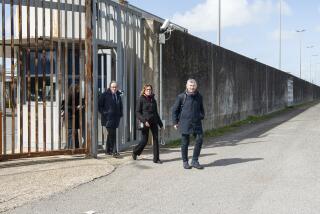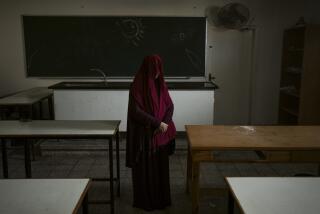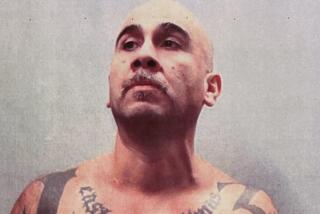Italy offers a glimpse of the international concern over violent extremism in prisons
During a phone conversation intercepted by Italian police, one prison inmate’s wife told her husband in no uncertain terms how incarceration was changing him for the worse.
“You are hanging around with stupid people!” Caterina Hmidi told her husband, Saber, who was at Rome’s Regina Coeli Jail. “You are doing stupid things and you don’t listen to your wife’s advice.”
The 2014 recording of the couple’s conversation, Italian police say, came from their surveillance of Saber Hmidi, a 34-year-old Tunisian who raised concerns by recruiting other inmates to become Islamic extremists and by threatening to decapitate prison guards.
Hmidi, who is serving three years and eight months for threatening police with a pistol, apparently plans to join the Islamic State militant group and seek martyrdom in Syria upon his release this year, police said.
Authorities say although Italy has not seen the terrorism experienced elsewhere in Europe or around the world, the country’s incarceration facilities could be incubators for people at least considering extremism.
The problem, authorities say, exists at jails and prisons around the world. In response, the United Nations Office on Drugs and Crime recently announced it had launched its first handbook on managing violent extremist prisoners and preventing radicalization to violence in prisons.
These are fragile people who hate everyone and often two or three words are enough to convince them that an extreme act can give sense to their lives.
— Izzedin Elzir, Italy-based Palestinian imam
“Overcrowding, poor prison conditions and infrastructure, insufficient prison management capacity as well as corruption, for example, are all factors which will poison attempts to effectively prevent and counter violent extremism in prisons,” said Aldo Lale-Demoz, deputy executive director for UNODC.
The U.N. says it is impossible to know exactly how many violent extremists are in prison custody around the world, but some countries may have only a few while others may have hundreds or thousands.
The handbook, which looks at the phenomenon in Europe, Africa and the U.S., focuses on better training for guards to spot extremists who prey on, and recruit, weak and disoriented fellow prisoners.
French officials said a man who attacked a soldier at Orly Airport last month before being shot dead by the soldier’s colleagues was flagged to the country’s intelligence services as a possible Islamist extremist after he was “radicalized in prison.”
The number of extremists who commit attacks in France after serving time has led to French jails being dubbed “finishing schools” for terrorists.
In Italy, Justice Minister Andrea Orlando said recently that the country’s jails had become “hotbeds for radicalization.” The nation has about 55,000 inmates.
Public alarm about Islamists has grown in Italy as the number of migrants sailing from North Africa has soared, with 500,000 arriving in the last three years. Italy has a population of about 60 million, including an estimated 1.2 million to 1.4 million Muslims.
As extremists have set off alarm bells about terrorism, the government has moved to round up and expel potential terrorism suspects who are not citizens. More than 160 have been thrown out of the country since January 2015, often after surveillance of social media found them praising Islamic State extremists, threatening to mount attacks or contacting known terrorists, officials said.
“The paths to radicalization are above all on the Web and in jails,” Italian Prime Minister Paolo Gentiloni said recently.
As part of the effort to tackle extremism in prisons, a number of changes are being made in cooperation with the Union of Italian Islamic Communities, a lobby group.
Imams are training prison guards on how to accommodate the needs of Muslim inmates, and a new group of 13 imams is making twice weekly visits to six key jails, said Izzedin Elzir, an Italy-based Palestinian imam who heads the group.
“Italian jails are full of young Muslims who do time for petty crimes but emerge radicalized,” said Stefano Dambruoso, a centrist member of Parliament and former magistrate who supports moderate imams preaching in jails.
Hmidi, a former holiday camp entertainer in Tunisia, married an Italian and had a daughter when he migrated to Italy, but he fell into drug dealing and was put in jail in Velletri in 2011.
He was released after a while “profoundly changed” by extreme Islamist indoctrination, police said, and was arrested again in 2014 for pulling a pistol on two police officers. He was shuttled between six different jails, using the opportunity to preach and organize groups of prisoners who would violently assault anyone complaining of their loud praying.
In another case, officials have said they think Anis Amri, who drove a truck into a market in Germany in December, killing 12 people, was also radicalized in Italian jails. Amri fled Germany but was shot dead by police in a suburb of Milan, Italy.
He had gone to Italy from Tunisia in 2011 and reportedly torched a migrant center in Sicily, then committed to radical Islam during four years spent shuttling among Sicilian jails, where he threatened to behead a Christian inmate who refused to convert to Islam.
Like Hmidi, Amri was moved repeatedly from jail to jail in Italy when he caused trouble, allowing him to push his brand of militant Islam to a growing and changing audience, authorities said.
“These are fragile people who hate everyone and often two or three words are enough to convince them that an extreme act can give sense to their lives,” Elzir said.
Patrizio Gonnella, the head of Antigone, a charity that campaigns for prisoners’ rights, said many priests visit prisons and many facilities have chapels because of a 1929 deal between the Vatican and the Italian state. Fewer representatives of other religions go to the prisons, he said.
Several activists said part of the challenge they face is helping prisoners at risk of radicalization to see violence as a wrongful act against humanity.
“Understanding that is the first step to convince them they are on the wrong path,” Elzir said. “It’s a civil, religious and moral duty.”
Kington is a special correspondent.
MORE WORLD NEWS
France’s presidential election could help shape what’s next for an often bitterly divided Europe
Civilian casualties from airstrikes grow in Iraq and Syria. But few are ever investigated
In the midst of Iraq’s war against Islamic State, a bicycle culture takes root
More to Read
Start your day right
Sign up for Essential California for news, features and recommendations from the L.A. Times and beyond in your inbox six days a week.
You may occasionally receive promotional content from the Los Angeles Times.






